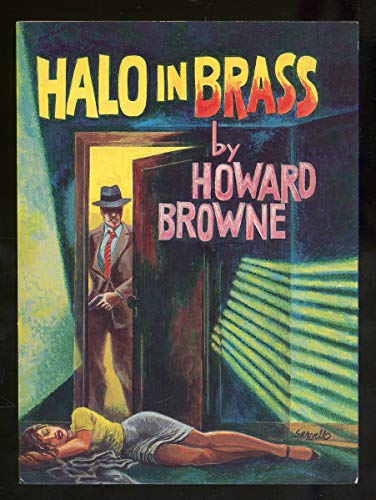Book Review: Halo in Brass by Howard Browne (writing as John Evans)
Paul PIne, private detective, is hired on a missing persons case. It seems that Laura Fremont, originally from Lincoln, Nebraska, has gone incommunicado in the big city of Chicago. Her plain rural parents are worried sick. The first obstacle pops up in that before she left, Laura filched every photograph of her in the family albums. That’s a bit odd. Also, she hasn’t communicated with any of her old friends either. The only other person in her friends group who moved to Chicago was that Rehak girl, and Laura would never have communicated with her.

Mr. Pine does a little digging, and finds out that Grace Rehak had a sordid past that indicates she had to leave town in a hurry. But her trail’s a little fresher, and might produce a lead. Before Pine’s even out of town, though, he finds his hotel bellhop murdered, his head smashed in. Clearly, one of the young women he’s asking around about does not want to be found in spades.
So it’s back to Chicago to track down either or both of Laura Fremont and Grace Rehak. Problem is, the people who might have told him something keep turning up dead!
This 1949 hard-boiled detective novel was the third in the Paul Pine series. (The fourth, Taste of Ashes, is considered a classic.) Mr. Pine is a hard-drinking, heavy smoking fellow who gets coshed from behind a lot. He uses a lot of similes and vivid descriptions. “The foyer was large, with a tropical decor that would fool nobody south of the Arctic Circle.” He’s cynical, plays fast and loose with the rules of his profession, and isn’t trusted by the police, but has a small sentimental streak running underneath.
The author’s preface to the reprint edition reveals that he tried extra hard to make the killer not the least likely suspect, but “someone impossible to suspect.” Of course, if the reader goes in knowing that, it makes the clues a bit easier to spot.
Content note: Homophobia. Mr. Pine and the police are disgusted by lesbianism, and period societal homophobia is a contributing factor in why several bad things happen over the course of the story. The author’s preface notes that he shared those attitudes at the time of writing, but hopes the story can stand up regardless.
Overall: This is a fast-paced, colorfully written detective story with plenty of twists. Obviously not for everyone but hard-boiled fans should enjoy it fine.

